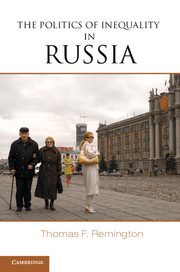Book contents
- Frontmatter
- Contents
- List of Figures
- List of Tables
- Preface
- 1 The Political Sources of Income Inequality in Russia
- 2 Employment, Earnings, and Welfare in the Russian Transition
- 3 Regime Diversity in the Russian Regions
- 4 Democracy and Inequality in the Russian Regions
- 5 Regional Regimes and the Labor Market: Evidence from the NOBUS Survey
- 6 Helping Hands or Grabbing Hands? Government-Business Relations in the Regions
- 7 Accounting for Regime Differences
- 8 After the Crash
- Index
- References
7 - Accounting for Regime Differences
Published online by Cambridge University Press: 05 June 2012
- Frontmatter
- Contents
- List of Figures
- List of Tables
- Preface
- 1 The Political Sources of Income Inequality in Russia
- 2 Employment, Earnings, and Welfare in the Russian Transition
- 3 Regime Diversity in the Russian Regions
- 4 Democracy and Inequality in the Russian Regions
- 5 Regional Regimes and the Labor Market: Evidence from the NOBUS Survey
- 6 Helping Hands or Grabbing Hands? Government-Business Relations in the Regions
- 7 Accounting for Regime Differences
- 8 After the Crash
- Index
- References
Summary
The preceding chapters presented evidence that differences in the structure of earnings are the major factor determining the level and distribution of incomes across Russia's regions. Taxation and social spending did little to mitigate the inequality generated in the marketplace, and while the shift to lower tax rates and a regressive tax scale in the 2000s generated greater revenues for federal and regional social programs, these did not overcome the widening in the dispersion of earnings across regions and economic sectors. We observed that more democratic regions tend to have higher levels of inequality but also higher levels of social spending, as well as higher overall wage levels. I argued that these regional regime differences are shaped by characteristics of firm-government relations that affect the climate for enterprise. In more open, pluralistic regions, political leaders provide enterprise directors more opportunities to participate in regional decision making and offer greater security from arbitrary treatment by government in return for firms' acceptance of their social responsibilities, including tax compliance. The greater security of political and economic rights of the more democratic regions is also manifest in the firms' greater tendency to invest in productive capacity, as well as in the tendency to experience lower levels of corruption. This is already a complex chain of causal inference, with gaps in the quantitative evidence that we have filled in with suppositions drawn from published case studies of individual regions.
- Type
- Chapter
- Information
- The Politics of Inequality in Russia , pp. 172 - 200Publisher: Cambridge University PressPrint publication year: 2011



